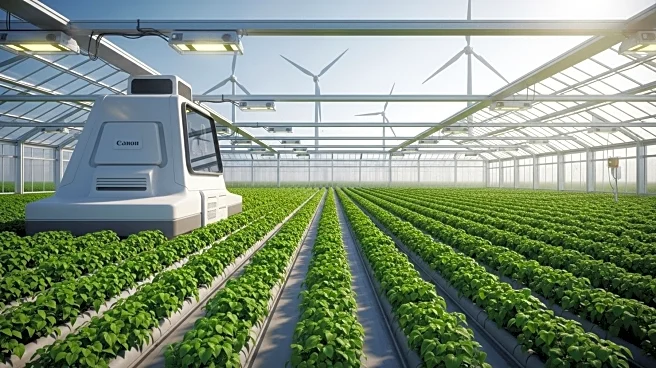What's Happening?
The University of Leeds farm, located between Leeds and York, is participating in a significant research project aimed at reducing agricultural emissions. This initiative is part of the Climate Smart Research project, which involves 33 partners from 26 European countries. The farm will focus on reducing its carbon footprint by 55% over the next five years. The project will explore various methods, including managing emissions from manure and slurry, and utilizing hedgerows to prevent greenhouse gases from entering the atmosphere. The research is funded by the Horizon Europe programme, with the University of Leeds receiving £1.1 million to support its efforts. Professor Guy Ziv from the School of Geography is leading the project, emphasizing the importance of understanding the farm as an interconnected system to identify effective solutions.
Why It's Important?
This research is crucial for advancing climate-smart agriculture, which aims to make farming practices more sustainable and resilient to climate change. By developing evidence-based options that are both environmentally and economically viable, the project could significantly impact European agriculture. The findings may offer valuable insights for U.S. agricultural stakeholders seeking to implement similar strategies to reduce emissions and enhance sustainability. The collaboration among various European farms highlights the importance of shared knowledge and innovation in addressing global environmental challenges.
What's Next?
Over the next five years, the University of Leeds farm will continue to test and promote solutions for climate-smart farming. The project aims to speed up the transition toward climate-neutral agriculture in Europe. As the research progresses, findings will be shared among participating farms, potentially influencing agricultural policies and practices across Europe and beyond. The success of this initiative could encourage similar projects in the U.S., fostering international collaboration in sustainable agriculture.
Beyond the Headlines
The project not only addresses environmental concerns but also explores the role of insect farming in sustainable food systems. This aspect of the research could lead to innovative approaches in food production, contributing to global food security. The integration of regenerative agriculture trials further underscores the potential for long-term shifts in farming practices, promoting ecological balance and resource conservation.











